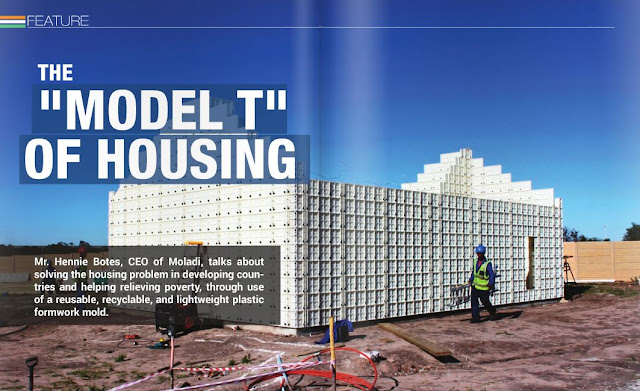Model T of mass housing
The Model T of mass housing - moladi
The mass production techniques Henry Ford championed in the automotive industry, lean production and lean assembly, is what our CEO, Hennie Botes is focused on implementing in affordable mass housing in order to eliminate waste, speed up production resulting in cost reduction
moladi - Mass Housing Construction System
Mr Hennie Botes, CEO of moladi, talks about solving the housing problem in developing countries and helping relieving poverty, through the use of a reusable, recyclable and lightweight plastic formwork mold.
moladi
approaches building construction as a "Production Line" similar to
that of the automotive industry. "One of the important principles under
a lean production paradigm is termed "lean assembly". This refers to
simplifying the process of assembly through industrialisation,
modularisations, standardisation, and continuous flow processes. The
reduction of operations required for a production process means less
chance of the occurrence of errors, waste and rework. This follows
from the same logic that the fewer the number of operations, the
higher the quality of the product and a predictive timeline,
resulting in cost savings."
The application of the moladi technology is
not dependant on skilled labour and is especially suited for
repetitive housing schemes to enable community involvement as well as
the individual to obtain their own home. The injection moulded formwork is lightweight and robust, allowing
for easy transportation and speedy assembly. The precision components
are interlocking to produce easy to handle panels which can be re-used
50 times; making the technology cost effective due to this repetitive
application scheme. moladi provides for a realistic modern
alternative in overcoming the widespread misuse of scarce materials,
particularly timber, by introducing a system that combines moladi with
other indigenous materials, which are suitable for easy handling.
It all comes down to efficiency of producing a cost effective, socially acceptable wall for people (knock test), then fixing all the other components, like door, windows, roof, ceiling, bathroom fixtures etc., onto the "chassis" (the wall). So in reality, who can produce a wall on a stand the quickest, and millions of them? We simply use a cost per square meter of a wall (chassis) on a foundation (in position), ready for "assembly" as a yardstick of efficiency. This is method compares "Apples to Apples"?
It all comes down to efficiency of producing a cost effective, socially acceptable wall for people (knock test), then fixing all the other components, like door, windows, roof, ceiling, bathroom fixtures etc., onto the "chassis" (the wall). So in reality, who can produce a wall on a stand the quickest, and millions of them? We simply use a cost per square meter of a wall (chassis) on a foundation (in position), ready for "assembly" as a yardstick of efficiency. This is method compares "Apples to Apples"?
 |
| moladi - MODEL T |
 |
| Affordable Housing |
Reduce Cost of Housing Construction
The impact of appropriate technology becomes particularly noticeable
when innovative solutions are used and promoted by social entrepreneurs
who put social impact at the heart of their business. The combination of
low-cost technology and social entrepreneurship can have far-reaching
implications for thousands of lives. Creating jobs, stimulating
ownership confidence and the spirit of innovation – this is what social
businesses are looking for
For more information on moladi - Visit www.moladi.com
Keywords - mass housing, Model T, moladi, housing, production, lean, Henry Ford, Hennie Botes, assembly line, technology, eliminate waste, speed, production, cost reduction, #moladi, construction, material, plastic formwork, formwork, system, technology



